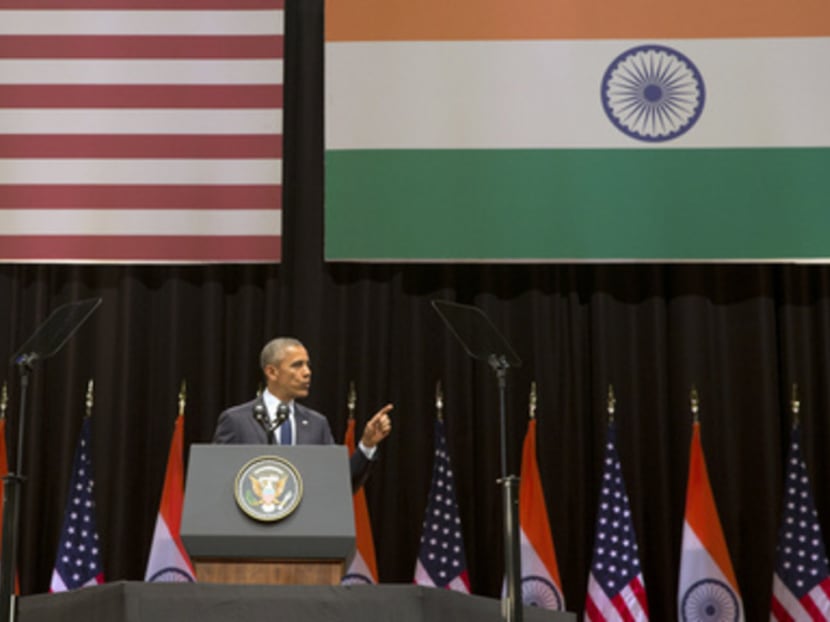Obama nudges India towards religious and gender equality
NEW DELHI — United States President Barack Obama nudged India yesterday over its record of religious tolerance and gender equality, urging New Delhi to fulfil its constitutional pledge to uphold the “dignity of the individual”. His speech in a townhall address at the end of a three-day official visit to India was aimed partly at his newfound friend, Prime Minister Narendra Modi, who has been criticised for not doing more to safeguard political dissent, tackle human trafficking and rein in groups accused of promoting a Hindu-dominant agenda.

President Barack Obama delivered an address to an audience of 1,500, mostly young Indians, at Siri Fort Auditorium in New Delhi yesterday (Jan 27). Photo: The New York Times
NEW DELHI — United States President Barack Obama nudged India yesterday over its record of religious tolerance and gender equality, urging New Delhi to fulfil its constitutional pledge to uphold the “dignity of the individual”. His speech in a townhall address at the end of a three-day official visit to India was aimed partly at his newfound friend, Prime Minister Narendra Modi, who has been criticised for not doing more to safeguard political dissent, tackle human trafficking and rein in groups accused of promoting a Hindu-dominant agenda.
In effect, Mr Obama was saying their developing partnership did not mean Mr Modi would get a free pass. But as he often does overseas, Mr Obama couched his sharp comments with an acknowledgment that the US had its flaws, an effort to avoid looking too much like he was lecturing. Citing his experiences as an African-American, he said: “Even as America has blessed us with extraordinary opportunities, there were moments in my life when I’ve been treated differently because of the colour of my skin.”
Mr Obama appeared particularly impassioned as he talked about the need to stop treating women as second-class citizens. “Every girl’s life matters,” he said, as his wife Michelle Obama watched from the audience. “Every daughter deserves the same chance as our sons. Every woman should be able to go about her day — to walk the street or ride the bus — and be safe and treated with respect and dignity. She deserves that,” he said to applause from the audience of 1,500 at the Siri Fort Auditorium.
Equality is enshrined in India’s constitution, but religious minorities and women have experienced harassment and violence. A gang rape on a bus in New Delhi in 2012 sparked protests, which prompted more stringent laws.
Analyst C Raja Mohan said the speech was a warning to Mr Modi. “It’s a good caution to the ruling party, ‘Don’t think you can keep doing what you’re doing domestically and won’t get a reaction from the international community.’ ”
Mr Modi has been careful to stay away from divisive rhetoric since he became Prime Minister, but had been an activist with right-wing Hindu organisation Rashtriya Swayamsewak Sangh before entering politics. Right-wing groups campaigned effectively for him and, since he was elected, they have pushed for a more activist agenda.
One group has announced a campaign to convert members of religious minorities to Hinduism, arguing that Muslims or Christians, or their forebears, were originally Hindu. One of Mr Modi’s ministers recently asked an audience, in a play on words in Hindi, to “decide whether you want a government of those born of Ram, or those born illegitimately”, words interpreted as derogatory to Muslims.
Though Mr Modi is said to have discouraged such rhetoric in private, he has made no public comment on these events, as activists have urged him to do. “Because he is such a strong leader and prominent face, it always comes down to him, that he isn’t speaking,” said Human Rights Watch South Asia director Meenakshi Ganguly. “Does that convey the leaning of the administration? Because that is why minorities begin to feel vulnerable.”
India is largely Hindu, with almost 80 per cent following the faith. At more than 12 per cent, Muslims are India’s largest minority, with Sikhs, Christians and Buddhists making up the rest. While religious groups largely coexist peacefully, the nation has seen violence, primarily between Hindus and Muslims. Agencies






